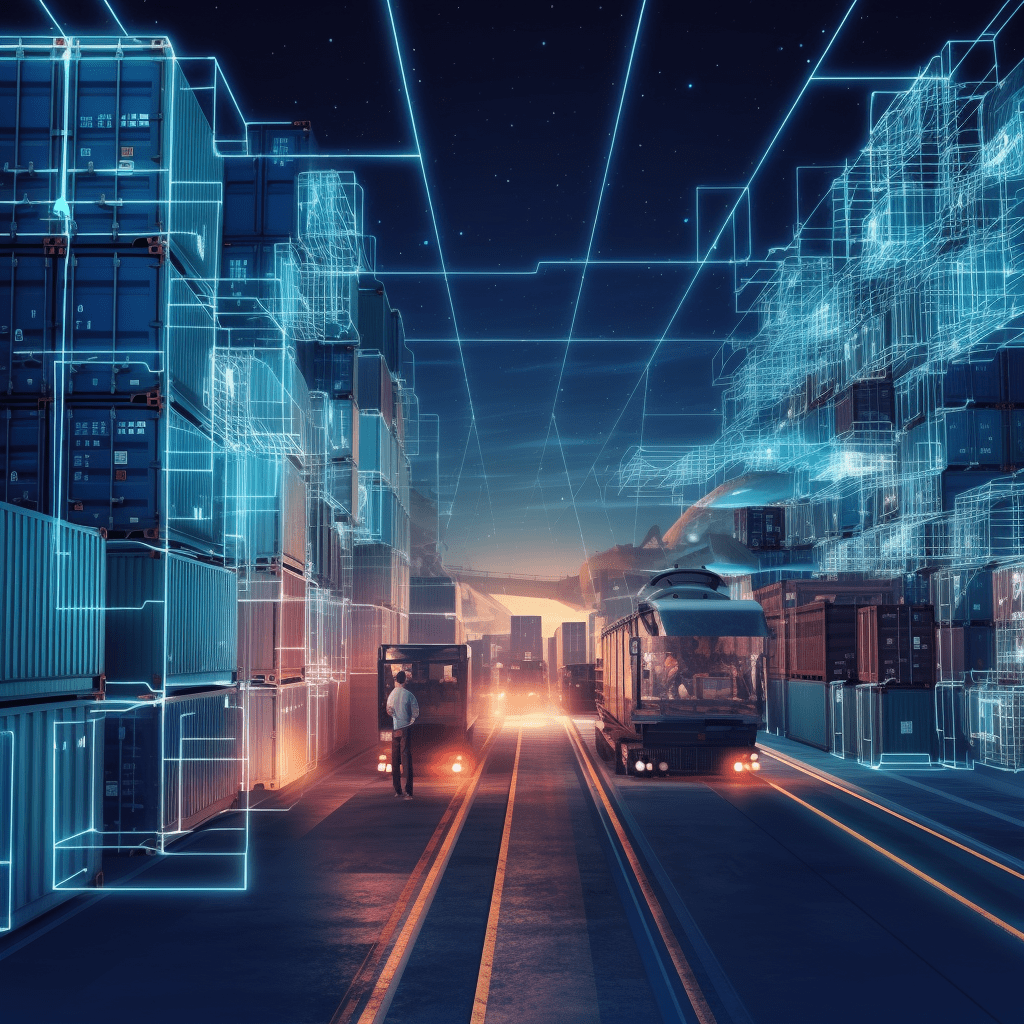The Future of Logistics: Leveraging AI and Robotics for Smooth Operations
 3 years ago
By John Lewis Elopre
3 years ago
By John Lewis Elopre

Introduction
Logistics plays a crucial role in the modern economy by facilitating the movement of goods from suppliers to consumers. Traditionally, logistics relied on manual processes and guesswork, leading to inefficiencies, delays, and increased costs. However, with the emergence of AI and robotics, logistics companies are now leveraging data-driven insights and automation to optimize their operations significantly.
Understanding the Evolving Logistics Landscape
– The Importance of Logistics in the Global Economy
Logistics is the backbone of trade, enabling businesses to connect with customers worldwide. It ensures that goods are delivered accurately and on time, fostering economic growth and global interconnectedness.
– Challenges Faced by Traditional Logistics Systems
Traditional logistics faced numerous challenges, such as inaccurate demand forecasting, inefficient route planning, and human errors in warehouse management. These limitations prompted the need for innovative solutions powered by AI and robotics.
Embracing Artificial Intelligence (AI) in Logistics
– AI’s Role in Enhancing Supply Chain Efficiency
AI revolutionized the supply chain by analyzing vast datasets to optimize inventory levels, reduce lead times, and improve demand forecasting accuracy. The real-time insights provided by AI enable companies to make informed decisions quickly.
– Predictive Analytics and Demand Forecasting
AI-driven predictive analytics allows logistics companies to anticipate demand fluctuations, optimize inventory, and minimize wastage. This level of forecasting accuracy empowers businesses to maintain leaner inventories and respond proactively to market changes.
– AI-driven Route Optimization and Fleet Management
With AI, logistics companies can optimize delivery routes, considering factors like traffic, weather, and delivery time windows. This optimization leads to reduced fuel consumption, lower emissions, and faster delivery times.
Unleashing the Power of Robotics in Logistics
– Advancements in Robotic Automation
Robotics in logistics has evolved from simple automation to sophisticated robots capable of autonomous operations. These robots can handle repetitive tasks with precision, freeing up human workers for more complex and strategic roles.
– Warehousing and Order Fulfillment
Robotic automation in warehouses streamlines order fulfillment processes. Robots can efficiently pick, pack, and organize goods, minimizing errors and improving order accuracy.
– Autonomous Last-Mile Delivery Solutions
The last-mile delivery, often the most challenging aspect of logistics, can be revolutionized with autonomous delivery robots and drones. These solutions ensure quicker and contactless deliveries, enhancing customer satisfaction.
Combining AI and Robotics for Seamless Operations
– AI-Integrated Robotic Warehouses
Integrating AI with robotics in warehouses creates smart, data-driven facilities that can self-optimize processes. This leads to increased productivity and better utilization of available space.
– Smart Inventory Management
AI-powered robots can conduct real-time inventory checks, reducing stockouts and overstock situations. This synergy between AI and robotics enhances inventory management accuracy.
– Collaborative Robots (Cobots) Working Alongside Humans
Cobots are designed to collaborate with human workers safely. These robots can assist in tasks requiring physical strength, precision, or repetitive actions, promoting efficiency and safety.
The Benefits of Adopting AI and Robotics in Logistics
– Improved Accuracy and Error Reduction
AI and robotics significantly reduce human errors, leading to more accurate order processing, inventory management, and delivery operations.
– Enhanced Efficiency and Cost Savings
Automation increases operational efficiency, allowing logistics companies to handle higher volumes of orders without proportionally increasing costs.
– Scalability and Adaptability
AI and robotics offer scalable solutions that can adapt to changing market demands and business needs, ensuring long-term viability.
Addressing Challenges and Concerns
– Workforce Transformation and Training
The adoption of AI and robotics requires upskilling the workforce to manage and work alongside automated systems effectively.
– Cybersecurity and Data Privacy
As logistics becomes more reliant on technology, safeguarding data and systems from cyber threats becomes a critical concern.
– Ethical Considerations in Robotics
Robots replacing human workers raise ethical questions about job displacement and the role of humans in a world dominated by machines.
Real-world Applications of AI and Robotics in Logistics
– Case Study 1: AI-driven Supply Chain Optimization
A case study highlighting how an AI-driven supply chain optimization system transformed a company’s logistics, resulting in cost savings and improved customer satisfaction.
– Case Study 2: Robotic Last-Mile Delivery
An exploration of how autonomous delivery robots revolutionized last-mile logistics, making deliveries more efficient and eco-friendly.
The Road Ahead: Future Trends and Innovations
– Integration of Blockchain in Logistics
Blockchain technology offers enhanced transparency, traceability, and security in logistics operations.
– Swarm Robotics for Warehouse Management
Swarm robotics employs multiple robots working in tandem to optimize warehouse processes further.
– AI-enabled Predictive Maintenance
AI-powered predictive maintenance ensures timely repairs and reduced downtime for logistics equipment.
Conclusion
The future of logistics lies in the seamless integration of AI and robotics into every aspect of the supply chain. By embracing these transformative technologies, logistics companies can unlock unprecedented levels of efficiency, accuracy, and adaptability. However, addressing workforce challenges, data security, and ethical considerations will be crucial for a successful transition into this advanced era of logistics.
FAQs
1. How will AI improve logistics operations?
Artificial Intelligence will enhance logistics operations by optimizing supply chains, improving demand forecasting, and enabling route optimization for faster deliveries.
2. What role do robots play in warehousing?
Robots in warehousing automate tasks like picking, packing, and organizing goods, streamlining order fulfillment processes and reducing errors.
3. Are there any risks associated with adopting AI and robotics in logistics?
While the benefits are significant, challenges such as workforce training, cybersecurity, and ethical concerns about job displacement need to be addressed.
4. Can AI and robotics work together in logistics?
Yes, AI and robotics can work together to create smart warehouses, improve inventory management, and enhance overall logistics efficiency.
5. What does the future hold for logistics with AI and robotics?
The future of logistics will witness further integration of AI and robotics, making supply chains more agile, cost-effective, and environmentally friendly.

Navigating the Complex World of Global Regulatory Affairs in Oncology
In today's fast-paced global pharmaceutical landscape, the regulatory affairs sector plays a pivotal role in ensuring the safety, efficacy, and market access of oncology drugs. As the demand for innovative cancer therapies continues to grow, understanding the intricacies of global...
3 years agoNavigating the Complex World of Global Regulatory Affairs in Oncology
In today's fast-paced global pharmaceutical landscape, the regulatory affairs sector plays a pivotal role in ensuring the safety, efficacy, and market access of oncology drugs. As the demand for innovative cancer therapies continues to grow, understanding the intricacies of global...
3 years ago
Overcoming the Hurdles: Navigating the Challenges in Oncology Clinical Trials
In the world of medical research, oncology clinical trials are at the forefront of innovation and discovery. These trials play a crucial role in advancing our understanding of cancer and developing more effective treatments. However, the path to successful oncology...
3 years agoOvercoming the Hurdles: Navigating the Challenges in Oncology Clinical Trials
In the world of medical research, oncology clinical trials are at the forefront of innovation and discovery. These trials play a crucial role in advancing our understanding of cancer and developing more effective treatments. However, the path to successful oncology...
3 years ago
Embracing a Patient-Centric Approach in Oncology Trials
In the realm of healthcare and medical research, the term "patient-centric" has gained significant traction in recent years. This shift in focus towards prioritizing patients' needs and preferences is not only transforming the healthcare industry but is also making waves...
3 years agoEmbracing a Patient-Centric Approach in Oncology Trials
In the realm of healthcare and medical research, the term "patient-centric" has gained significant traction in recent years. This shift in focus towards prioritizing patients' needs and preferences is not only transforming the healthcare industry but is also making waves...
3 years ago